Arundel Street
Arundel Street is a street in the City of Westminster, London, that runs from Strand in the north to Temple Place in the south. It is on land once occupied by Arundel House and its gardens.
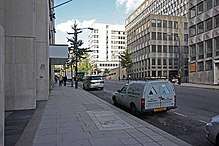
Location
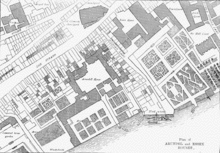
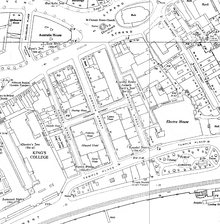
Arundel street runs from Strand in the north to Temple Place in the south. Before the construction of the Victoria Embankment (1865–70) it ran as far as the north side of the River Thames. It is joined on its eastern side by Water Street and the modern Maltravers Street, which runs to Milford Lane in the east but was destroyed by the construction of 190 Strand. Howard Street once joined Arundel on the west but no longer exists.
History
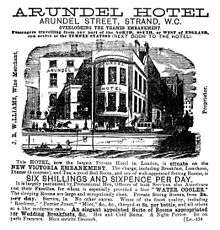
The street is on land once occupied by Arundel House and its gardens, the property of the Howard family, Dukes of Norfolk.[1] Arundel Street and its neighbouring streets, Howard, Norfolk, and Surrey, were all built after Arundel House was demolished by the earl of Arundel in 1678.[2]
It is mentioned nostalgically in John Gay's Trivia (1716) as follows:
"Behold that narrow street which steep descends,
Whose buildings to the slimy shore extends;
Here Arundel's fam'd structure rear'd its frame,
The street alone retains the empty name"[3]
The Whittington Club, formed 1847, stood on the east side at the north end on the corner with Water Street. It was designed to offer the advantages of an expensive west end club at lower cost to the middle classes and also offered educational classes.[4]
The Arundel Hotel stood at the south end of the street on the western side at the end of the nineteenth century and start of the twentieth. It billed itself as "the largest private hotel in London", providing rooms to professional men, officers, and Americans and their families, "for whom is especially provided a free "water cooler".[5] It was rebuilt in the late nineteenth century and the bay front that faced Victoria Embankment was replaced with a gothic design. The hotel existed until at least the mid-twentieth century.
Buildings
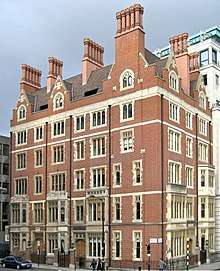
A large mixed-use development is underway on the eastern side of the street known as 190 Strand, as a result of which Maltravers Street will cease to exist.[6][7][8]
At the south end on the corner with Temple Place is the modern Arundel House, home of the International Institute for Strategic Studies. The building is not on the site of the former Arundel House which was further north.
The western side of the street is taken up with office buildings and 190 Strand.
Former inhabitants
Former inhabitants of Arundel Street include:
- John Anstis, Garter King at Arms.[3]
- Eustace Budgell, writer for The Spectator and MP.[3][9]
- George Darley[9]
- Simon Harcourt, Queen Anne's Lord High Chancellor of Great Britain.[3]
- Coventry Patmore, poet and author of The Angel in the House.[9]
- John Howard Payne, composer of the song "Home! Sweet Home!"[9]
- John Playford, publisher of The English Dancing Master (1651).[3]
- Mrs Porter, tragic actress.[3]
- Thomas Rymer, antiquarian, died at his home in the street in 1713 and was buried at nearby St Clement Danes.[9]
References
| Wikimedia Commons has media related to Arundel Street. |
- Bebbington, Gillian. (1972) London street names. London: B.T. Batsford. p. 27. ISBN 0713401400
- Richardson, John. (2000). The annals of London: A year-by-year record of a thousand years of history. Berkeley & Los Angeles: University of California Press. p. 155. ISBN 978-0-520-22795-8.
- Wheatley, Henry B. (1891) London, past and present: Its history, associations, and traditions. Vol. I. London: John Murray. p. 74.
- Cruchley, G.F. (1862) London guide: A handbook for strangers &c. London: G.F. Cruchley. p. 218.
- Advertising, The Arundel Hotel.
- 190 Strand. GRID Architects. Retrieved 14 December 2016.
- 190 Strand. Archived 2018-10-24 at the Wayback Machine St Edward Homes. Retrieved 14 December 2016.
- 190 Strand. St Edward Homes. Retrieved 14 December 2016.
- Williams, George G. Assisted by Marian and Geoffrey Williams. (1973) Guide to literary London. London: Batsford. p. 86. ISBN 0713401419